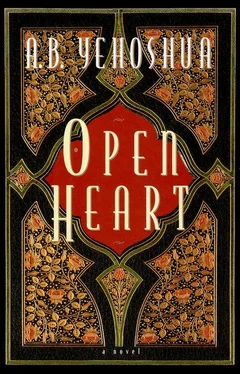A. Yehoshua - Open Heart
Здесь есть возможность читать онлайн «A. Yehoshua - Open Heart» весь текст электронной книги совершенно бесплатно (целиком полную версию без сокращений). В некоторых случаях можно слушать аудио, скачать через торрент в формате fb2 и присутствует краткое содержание. Год выпуска: 2014, Издательство: Peter Halban, Жанр: Современная проза, на английском языке. Описание произведения, (предисловие) а так же отзывы посетителей доступны на портале библиотеки ЛибКат.
- Название:Open Heart
- Автор:
- Издательство:Peter Halban
- Жанр:
- Год:2014
- ISBN:нет данных
- Рейтинг книги:3 / 5. Голосов: 1
-
Избранное:Добавить в избранное
- Отзывы:
-
Ваша оценка:
- 60
- 1
- 2
- 3
- 4
- 5
Open Heart: краткое содержание, описание и аннотация
Предлагаем к чтению аннотацию, описание, краткое содержание или предисловие (зависит от того, что написал сам автор книги «Open Heart»). Если вы не нашли необходимую информацию о книге — напишите в комментариях, мы постараемся отыскать её.
Open Heart — читать онлайн бесплатно полную книгу (весь текст) целиком
Ниже представлен текст книги, разбитый по страницам. Система сохранения места последней прочитанной страницы, позволяет с удобством читать онлайн бесплатно книгу «Open Heart», без необходимости каждый раз заново искать на чём Вы остановились. Поставьте закладку, и сможете в любой момент перейти на страницу, на которой закончили чтение.
Интервал:
Закладка:
“Yes, yes, it was great. I wanted to thank you, but I couldn’t find you.”
“Listen,” he said with a suddenly serious expression, “it doesn’t matter if you can’t find us in the plane, but what will happen if you lose us in India? We’ll have to lay down a few rules for keeping contact. In the meantime, you should know our private whistle, which has stood us in good stead ever since our honeymoon.” He whistled it a few times so that it would stick in my head.
On a soft and hazy afternoon we landed in India, and for a moment I had the feeling that we were entering not a living reality but a vast screen on which a Technicolor movie about India was being projected. Already I found myself squeezed against the two of them, next to the knapsack with the medical supplies and the suitcases, which looked clumsy and almost superfluous in the small space of the ancient cab and in the face of the Indian poverty bombarding us through the car windows in a whirlwind of color. Lazar’s face was pressed against my shoulder, very tired and wrinkled under the stubble of his beard, while the plump and lively face of his wife was made up and scented and radiant with childish excitement. Every few minutes she broke into loud cries of admiration, exhorting me and her husband to look at all kinds of passing Indians who seemed to her worthy of special attention. But Lazar refused to raise his head. Worn out, his eyes closed, he grumbled, “Enough, Dori, not now, I haven’t got the strength, we’ll have plenty of time to look later,” while I actually tried to respond to her cries, despite their annoying loudness and enthusiasm, and turned to see where she was pointing, repeating a silly sentence that I couldn’t get out of my head: “I feel as if it’s not real yet, as if it’s only some English movie about India, and we’ve become a little English ourselves.” And she smiled at me kindly, as if I were a child trying to be original. But when we reached the hotel recommended by the travel agency, within the walls of the old city, her enthusiasm suddenly plummeted, which confirmed my objections to her joining us. Although the hotel was quite ancient, neither I nor Lazar could see anything wrong with spending the night there. But as we neared the reception desk, her face fell and she began whispering to her husband, demanding to see the rooms before we handed over our passports. Lazar grumbled at first but finally gave in to her, and they left me in the lobby with the luggage and went up to examine the rooms. On their return the argument between them seemed to have grown sharper. Her face was flushed and determined, and he looked very annoyed indeed. “I don’t understand,” he repeated, “I simply don’t understand. It’s for one night, at the most two. I haven’t slept for thirty hours, I’m falling off my feet, and all I want is a simple bed. That’s all. Where are we going to find a better hotel now?” But she gripped his arm tightly in an angry, distraught gesture, as if she wanted to shut him up, and sent me an automatic smile when she saw me looking at her, perhaps in order to shut me up too. “One night is worth something in life too,” she said, rebuking her husband, and she gave me a reproachful look as well, even though I hadn’t said a word.
We had no alternative but to leave the hotel, and the minute we hit the street two Indian boys pounced on us, relieved us of the knapsack and suitcases, and led us to see other hotels. And since we now felt light and liberated after the long, cramped flight, and the weather was soft and mild, we walked as if floating on air to not one but five hotels. The travel agent’s warning that we were due to arrive in India at the height of the pilgrim season proved true. The hotels Mrs. Lazar approved of were full, and the hotels which could take us were rejected by this impossible woman, who went up by herself to “smell the rooms,” as her husband remarked with a helpless smile, in which to my astonishment I also sensed a hidden admiration. And thus we wandered around the streets of the old city in the company of the two boys, who were enthusiastically prepared to lead us farther and farther, until after an hour of searching we finally found a hotel which was “at least possible,” and whose prices turned out to be no higher than those of the ones that had been rejected. Our two rooms were next to each other, quite small but clean, or at least colorful. The windows were draped in curtains of pale green silk, like saris, and there were heavy chains of bright yellow wilted flowers hanging over the beds. After a day and a half I was really alone at last, and the welcome solitude wrapped me in its sweetness. It was already four-thirty in the afternoon, and I wondered whether I was too tired to do anything but take a shower and get into bed or whether I should go out now, before it got dark, into the new world beyond the door. In the end hunger gained the upper hand, and since Lazar and his wife had uncharacteristically failed to mention their plans for our next meal, I decided to go out and get something to eat on my own. I wasn’t sure how frugal I needed to be since the financial arrangements between us had not yet been finalized. All I had to go on was the vague and general statement of intent made by Lazar’s wife on the first evening in their apartment. The arguments over the choice of the hotel, which was situated in a far from elegant quarter, indicated that in spite of her indignant protests, expense was a factor to be taken into account, at least as far as Lazar was concerned. It wasn’t going to be a luxury trip. And indeed, why should it be?
There was no restaurant in the hotel, only a small, dim bar in which a few guests in white turbans and old-fashioned European suits sat paging through newspapers and conversing quietly in English, as if they were actually Britons who had been left behind when the Empire was abandoned and whom the years had darkened into old Indians. I changed a hundred dollars into rupees at the reception desk and emerged into a little street full of soft, dry sunlight, still clad in the thin skin of the English identity in which I had been pleasantly and secretly wrapped since landing in India. Unwilling to station myself, like an avid Israeli tourist, in front of the trays heaped up on the many food stalls, in order to nibble something sticky and mysterious, I decided to go back to the first, rejected hotel, where I had caught a glimpse of a large restaurant. I succeeded in retracing our footsteps with surprising ease, and entered the restaurant, where I examined the food lying on the tables before choosing the dish I fancied, a portion of roast meat buried in a thick black chapati resting on a large yellowish leaf. My hunger satisfied, I felt an urge to go upstairs and take a look at one of the rooms, to see what Mrs. Lazar had found so offensive. An Indian servant took me up to the second floor to show me the only vacant room left in the hotel, possibly the same room they had shown her. It was, in fact, a spacious room, with a view of a large, reddish fortress in the distance. I concentrated on the details, trying to see them through her eyes and understand what had put her off. The bed was large and covered with a gray blanket, clean but torn at the edges. One of the walls bore long thin stains, as if someone had thrown a drink at it. I took a step into the room in order to smell it. The Indian smiled at my side. I couldn’t smell a thing, apart from a faint, sweetish whiff of mold. What, then, had made her recoil? I wondered, thinking of the pampered woman with a new and unfamiliar anger.
I left the room, but instead of returning to our hotel, although I was tired and sticky, I set out for the fort I had just seen through the window. I didn’t want to waste a minute of my time in this fascinating place. We had already been told at the airport that we would have to travel from New Delhi to Gaya by train or bus, since at this time of year, with so many people on the move, we had no chance of getting onto a plane, or even perhaps of obtaining an air-conditioned compartment on the train. I assumed that Lazar, in a hurry to get back to Israel for his important meeting, would not want to hang around in New Delhi, and in spite of his promise about the fine sights we would see on the way, he would probably insist on setting out tomorrow, or at the most the day after tomorrow, in order to reach our destination as quickly as possible. And since I had a feeling that we would find the hepatitis patient in a worse state than her parents imagined and that from the minute we arrived I would have to be at her beck and call, because practical people like the Lazars didn’t drag a doctor to the ends of the earth at their own expense for nothing, I had better make the most of every chance I got to take in whatever I could of the magic of this place, which was already beginning to draw me to it.
Читать дальшеИнтервал:
Закладка:
Похожие книги на «Open Heart»
Представляем Вашему вниманию похожие книги на «Open Heart» списком для выбора. Мы отобрали схожую по названию и смыслу литературу в надежде предоставить читателям больше вариантов отыскать новые, интересные, ещё непрочитанные произведения.
Обсуждение, отзывы о книге «Open Heart» и просто собственные мнения читателей. Оставьте ваши комментарии, напишите, что Вы думаете о произведении, его смысле или главных героях. Укажите что конкретно понравилось, а что нет, и почему Вы так считаете.












